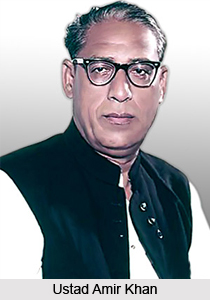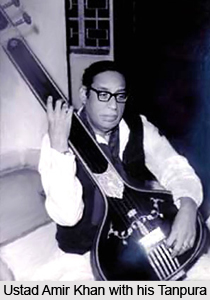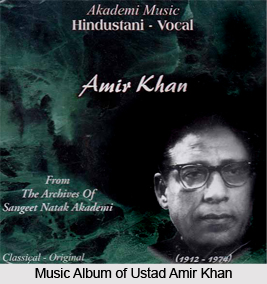 Ustad Amir Khan was a popular classical vocalist from India. He was the pioneering figure in the Hindustani Classical Music and founder of Indore Gharana. He was a renowned voice who impressed many minds with his highly trained classical voice. Though he started out his musical journey with sarangi lessons, but seeing his affinity towards vocal music, Amir Khan`s father devoted more time towards training him the minute details of vocal music.
Ustad Amir Khan was a popular classical vocalist from India. He was the pioneering figure in the Hindustani Classical Music and founder of Indore Gharana. He was a renowned voice who impressed many minds with his highly trained classical voice. Though he started out his musical journey with sarangi lessons, but seeing his affinity towards vocal music, Amir Khan`s father devoted more time towards training him the minute details of vocal music.
Early life of Ustad Amir Khan
Amir Khan was born in Indore to a musical family. His father was Shahmir Khan, a veena and sarangi player of Bhendibazaar Gharana and played at the court of Holkars of Indore.
Amir Khan`s mother died when he was nine months old. His younger brother named Bashir became a sarangi player at the Indore station of All India Radio. Amir Khan`s father initially trained him in sarangi. But later seeing his interest in vocal music his father slowly devoted more time to vocal training, mainly dealing with Merukhand technique. Ustad Amir Khan was exposed to various types of musical styles from a very early stage of his life. Every musician who visited Indore would come to their house, and there would be mehfils at their place on a regular basis. He also grasped the art of tabla playing from his maternal uncle from a very young age.
Amir Khan moved to Mumbai in the year 1934 and there he gave a few concerts and cut about half a dozen 78-rpm records. In 1936, following his father`s advice, Amir Khan, joined the services of Maharaj Chakradhar Singh of Raigadh Sansthan in Madhya Pradesh, but he stayed there only for a year. Ustad Amir Khan lost his father in the year 1937, following which he shifted to Delhi and then to Kolkata. But after Independence of India, Ustad Amir Khan moved back to Mumbai.
Personal life of Ustad Amir Khan
Ustad Amir Khan married to Ustad Vilayat Khan`s sister, Zeenat. Ustad Vilayat Khan was a renowned sitar player. This marriage eventually did not work out for Amir Khan, but the couple had a daughter named Farida. Then he married for a second time to Munni Bai and she gave birth to a son named Ekram Ahmed. In 1965, Ustad Amir Khan married third time to daughter of thumri singer Mushtari Begum of Agra, named Raisa Begum. It is rumoured that in the later part, Munni committed suicide. With Raisa he had a son, Haider Amir, later called Shahbaz Khan.
 Singing career of Ustad Amir Khan
Singing career of Ustad Amir Khan
Amir Khan, inspiring from the styles of Rajab Ali Khan (taans), Abdul Waheed Khan (vilambit tempo) and Aman Ali Khan (merukhand), modified his own singing style of singing. This style is commonly known as the Indore Gharana, mixes with the grandeur of dhrupad alapa and spiritual taste with the ornate brightness of khayal.
He aesthetically presented detailed progression (badhat) in ati-vilambit laya which is a very slow tempo cleverly using the bol-alap, followed by slowly speeding up sargams with many ornamentation, bol-taans, tans, which includes Merukhandi patterns and finally a drut laya or madhyalaya (medium or fast tempo) rubaidaar tarana or a chhota khayal. His baritone quality had three octave ranges which he would lend to his performances, which were often filled with understated elegance, reverence, restrained passion and an utter lack of showmanship.
He was the pivotal force behind the popularization of the tarana, and also khyalnuma compositions in Persian. Like Bade Ghulam Ali Khan, Amir Khan`s musical journey too started with sarangi training. But he generally performed khayals and taranas with only a tanpura and tabla for accompaniment. Sometimes he had a subdued harmonium accompaniment, but he almost never used the sarangi.
Characteristics of Amir Khan`s Singing:
* slow-tempo raga development
* improvisation mostly in lower and middle octaves
* tendency towards serious and expansive ragas
* emphasis on melody
* judicious use of pause between improvisations
* bol alap and sargam using merukhand patterns
* sparing application of murki
* use of kan swaras (acciaccatura) in all parts of performance
* controlled use of embellishments to preserve introspective quality
* rare use of tihai
* careful enunciation of text of bandish
* actual bandish as sung may or may not include antara
* multiple laya jatis in a single taan
* mixture of taan types in a single taan
* use of ruba`idar tarana (considered similar to chhota khyal)
Apart from lending his voice in various feature films like - Baiju Bawra, Kshudhita Pashan, Shabaab, and Jhanak Jhanak Payal Baaje, Ustad Amir Khan also sang in concerts. He also sang a ghazal Rahiye Ab Aisi Jagah for a documentary on Ghalib.
His ardent followers include Pandit Amarnath, Mukund Goswami, Gajendra Bakshi, Kankana Banerjee, A. Kanan, Srikant Bakre, Singh Brothers, Pradyumna Kumud Mukherjee and Poorabi Mukherjee, Amarjeet Kaur, Ajit Singh Paintal, Hridaynath Mangeshkar, Akhtar Sadmani, Bhimsen Sharma, Kamal Bose and Munir Khan.
 His style of music has also inspired many other Indian classical vocalists and instrumentalists, like Mahendra Toke, Shanti Sharma, Prabha Atre, Rashid Khan, Gokulotsavji Maharaj, Pt. Nikhil Banerjee and the Imdadkhani gharana. Although, Ustad Amir Khan, referred to his style of music as inspired from Indore Gharana, but he absorbed elements from various gharanas of Hindustani vocal music as well.
His style of music has also inspired many other Indian classical vocalists and instrumentalists, like Mahendra Toke, Shanti Sharma, Prabha Atre, Rashid Khan, Gokulotsavji Maharaj, Pt. Nikhil Banerjee and the Imdadkhani gharana. Although, Ustad Amir Khan, referred to his style of music as inspired from Indore Gharana, but he absorbed elements from various gharanas of Hindustani vocal music as well.
Awards Recived by Ustad Amir Khan
* Amir Khan was awarded the Sangeet Natak Akademi Award in 1967
* Padma Bhushan in 1971
Death of Ustad Amir Khan
Ustad Amir Khan died a premature death in Kolkata due to car accident.




